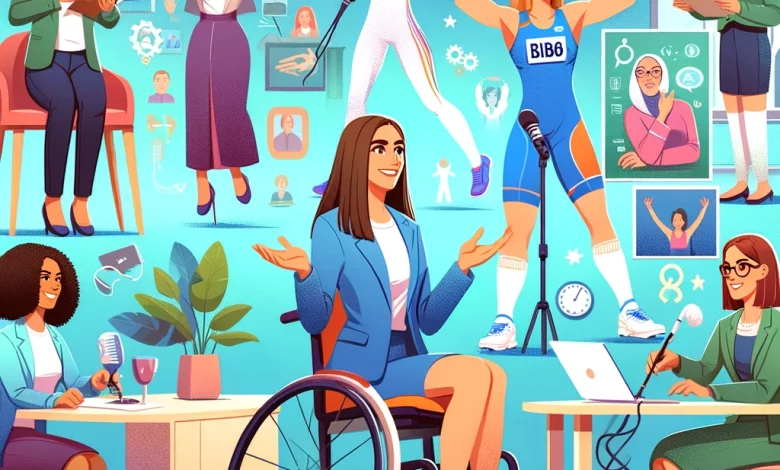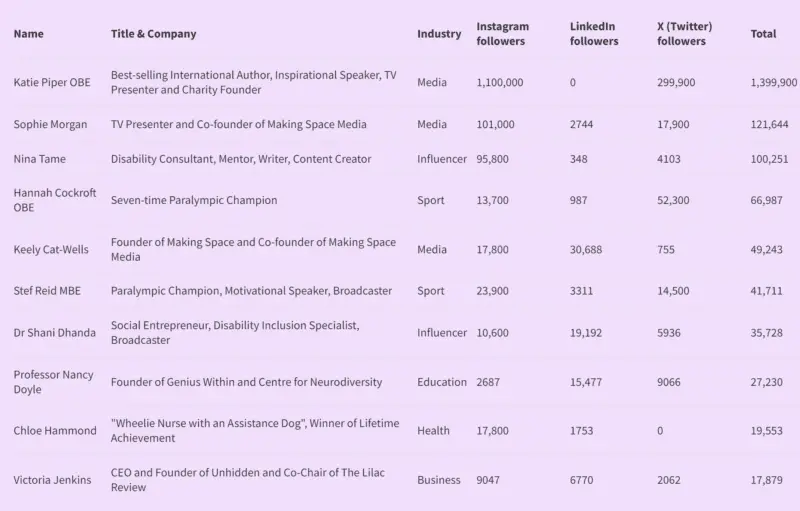
Top Ten Influential Disabled Women in Britain
UPDATED 2024 – The Top Ten Influential Disabled Women in the UK
10 Influential Women with Disabilities to Follow in 2024
Key Takeaways Table
| Name | Role | Followers | Achievements |
|---|---|---|---|
| Katie Piper | Best-selling Author, TV Presenter | 1.4 Million | Advocate for burn victims, Founder of the Katie Piper Foundation |
| Sophie Morgan | TV Presenter, Co-founder of Making Space | 121,000 | Promoter of inclusivity in media and employment |
| Nina Tame | Disability Consultant, Mentor | 100,000 | A debunker of disability myths, Accessibility advocate |
| Hannah Cockroft | Paralympic Champion | 66,000 | Seven-time gold medalist, Training for the Paris 2024 Paralympics |
| Keely Cat-Wells | Co-founder of Making Space Media | 49,000 | Disability space expert, Participant in high-level discussions |
Research by the Team at Cool Crutches – How did they determine who were the most influential Disabled Women?
Highlighting the most impactful advocates within the disabled community, the team at Cool Crutches & Walking Sticks has identified a group of remarkable women who are making significant strides in raising awareness, challenging stereotypes, and fostering inclusivity. These trailblazers, ranging from content creators and educators to founders and Paralympians, command a significant social media presence, influencing millions worldwide.
Katie Piper
Leading the pack is Katie Piper, a British TV presenter and author, whose story of resilience and determination has captured the hearts of nearly 1.4 million followers. Piper’s advocacy journey began following a devastating acid attack in 2008, which propelled her into the spotlight as a vocal supporter of burn victims. She established the Katie Piper Foundation to offer essential support to individuals living with burns and scars, demonstrating a relentless commitment to improving lives. Moreover, Piper’s literary contributions, including titles such as A Little Bit Of Faith and Confidence, alongside her efforts to influence policy changes, underscore her role as a pivotal figure in the community.
Sophie Morgan
Sophie Morgan, amassing over 121,000 followers, has emerged as another influential figure. Her work as a TV presenter, author and co-founder of Making Space stands as a testament to her dedication to creating accessible opportunities within the media, entertainment, and advertising industries. Through Making Space, Morgan strives to dismantle barriers to employment for underrepresented groups, ensuring a more inclusive future for all.
Nina Tame
Nina Tame, a Disability Consultant and Content Creator with a following exceeding 100,000, occupies the third spot on this list. Tame’s efforts to challenge prevailing disability stereotypes and promote accessibility shine through her consultancy and social media endeavours, making her a key voice in the ongoing dialogue around disability.
Hannah Cockroft
Hannah Cockroft OBE, a seven-time Paralympic champion, commands the attention of more than 66,000 followers. Known for her remarkable achievements on the track, Cockroft’s current focus on the Paris 2024 Paralympics highlights her unwavering commitment to excellence in para-athletics.
Keely Cat-Wells
Rounding out the top five is Keely Cat-Wells, co-founder of Making Space Media and a notable advocate within the disability space. Cat-Wells’ discussions with prominent figures and her recognition in forms such as The Diana Award and Forbes 30 Under 30 spotlight her influence and achievements in advancing the rights and representation of disabled individuals.
A Movement of Visibility and Change
These women epitomize the ethos that visibility fosters empowerment. By breaking barriers and creating spaces for disabled women in leadership, they not only challenge societal norms but also inspire future generations to aspire and achieve.
The Full list of Top 10 Disabled Women Influencers

Image description:
| Name | Title & Company | Industry | Instagram followers | LinkedIn followers | X (Twitter) followers | Total |
|---|---|---|---|---|---|---|
| Katie Piper OBE | Best-selling International Author, Inspirational Speaker, TV Presenter and Charity Founder | Media | 1,100,000 | 0 | 299,900 | 1,399,900 |
| Sophie Morgan | TV Presenter and Co-founder of Making Space Media | Media | 101,000 | 2,744 | 17,900 | 121,644 |
| Nina Tame | Disability Consultant, Mentor, Writer, Content Creator | Influencer | 95,800 | 348 | 4,103 | 100,251 |
| Hannah Cockroft OBE | Seven-time Paralympic Champion | Sport | 13,700 | 987 | 52,300 | 66,987 |
| Keely Cat-Wells | Founder of Making Space and Co-founder of Making Space Media | Media | 17,800 | 30,688 | 755 | 49,243 |
| Stef Reid MBE | Paralympic Champion, Motivational Speaker, Broadcaster | Sport | 23,900 | 3,311 | 14,500 | 41,711 |
| Dr Shani Dhanda | Social Entrepreneur, Disability Inclusion Specialist, Broadcaster | Influencer | 10,600 | 19,192 | 5,936 | 35,728 |
| Professor Nancy Doyle | Founder of Genius Within and Centre for Neurodiversity | Education | 2,687 | 15,477 | 9,066 | 27,230 |
| Chloe Hammond | “Wheelie Nurse with an Assistance Dog”, Winner of Lifetime Achievement | Health | 17,800 | 1,753 | 0 | 19,553 |
| Victoria Jenkins | CEO and Founder of Unhidden and Co-Chair of The Lilac Review | Business | 9,047 | 6,770 | 2,062 | 17,879 |
This article was created with research from the team at Cool Crutches.
Original Archive Article from 2013
John Pring has created The List, a breakdown of influential disabled people in modern Britain. And guess who features on the list… dynamic duo and Disability Horizons Co-editors, Martyn Sibely and Srin Madipalli! Here’s how John devised The List.
How do you decide whether Baroness [Jane] Campbell is more influential than Alastair Campbell? And if Alastair Campbell is more influential than comedian Adam Hills? And whether Adam Hills is more influential than campaigner Kaliya Franklin?
That was the task I set myself when I launched The List, which aims to provide an index of the disabled people who make a difference in modern Britain. At a time when many feel under attack from both the government and the media, I thought it would be interesting to spark a discussion about the disabled people who influence how we think and feel (but not always those we agree with), how we live, and how we are ruled.
To launch The List, I suggested 70 or so names, just to start the discussion rolling. Many of them were obvious: Baroness Tanni Grey-Thompson, Professor Stephen Hawking, Dame Anne Begg, the BBC’s Peter White etc. Almost immediately I began to receive suggestions of names I had either forgotten to include or even more shamefully had never heard of before. People like Philippa Willitts (the influential feminist blogger); Paula Garfield (the co-founder and artistic director of Deafinitely Theatre); Caglar Kimyoncu (the film-maker); D.H. Kelly (founder of Blogging Against Disablism Day) and Laraine Callow (founder of DeafHope UK women’s refuge – the first UK organisation for deaf women experiencing domestic violence).
I haven’t added every suggested name to The List, but so many additions have been made that it has already stretched past 200 names. I hope this process of extending The List will continue because I know there are many more talented, persuasive, creative, erudite, thoughtful, selfless and entertaining disabled people out there who have not yet found their way onto The List.
But, I am now also thinking about the next stage of the process: defining exactly what criteria The List will use to measure influence.
I blogged a couple of weeks ago with my initial thoughts, suggesting more than 30 ways in which disabled people can influence society, such as carrying out research, making television programs, providing goods and services, sitting on committees, tweeting, entertaining the public, sharing information, and advocating for those unable to defend their rights.
But other factors need to be taken into account. For example, The List is very much about people with influence now, rather than those whose work broke new ground 10 or 20 years ago. This means that influential and respected activists such as Rachel Hurst, Micheline Mason and Jenny Morris do not have a place. One disabled activist has suggested that The List should take into account the lasting impact, or legacy, of a piece of work, which can endure long after that work has been completed or published.
Another interesting factor that I had not thought of, but which was suggested to me, was that many disabled people have less time to do their influencing than non-disabled people, because of their impairment. So, those who experience fatigue, find networking difficult or impossible, and face other barriers, such as inaccessible public transport, will be taken into account of in The List.
And it is not just about influencing other disabled people. I want it to reflect those who impact the whole of society. After all, it is no good just talking to ourselves (as I know from my many hours working alone in my flat). The List also has to be about more than just a collection of ‘famous’ disabled people as so many disabled people work behind the camera, backstage, in dusty offices, from their bedrooms even, but achieve remarkable results, and create real change, without ever receiving public recognition.
I hope The List will do something to shine a spotlight on some of those whose work and contributions are usually left in the shadows.
Once I’ve settled on the right criteria to judge influence – with the help of as many other disabled people as possible – the process will begin of working out who should be where in The List. Again, I don’t think this process will be meaningful if it is not carried out with as much input as possible from disabled people.
I hope to start that final stage later this year. But even when this is completed, I would like The List to be a rolling, continually updated index that will be a reminder – perhaps to the Daily Mail, and some of our coalition politicians – of how much disabled people contribute to British society.
By John Pring
Check out…
• Disability Horizons: it’s all about YOU!
• DitzAbled Princess: new disability comic.
• Disability and the media: free speech is everything.
We’d love to know what you think about John’s list, or if you know anyone who should be on it, so get in touch by emailing us at editor@disabilityhorizons.com, messaging us on Facebook, tweeting us @DHorizons or leaving your comments below.